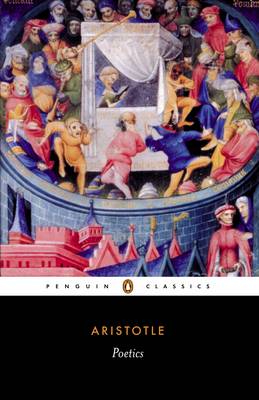I have visions of my mother seeing that I have read this and fainting, I thought I would share that image with you, at the idea of me reading something by Aristotle. I think before this last week or so the only reason I knew who Aristotle was was because my mother named one of our cats after him, see she is a classicist through and through. However recently I have been reading lots of books about how to write and why people write and the mechanics of it, both for myself as a writer and indeed as a reader. In the wonderful ‘Monkeys With Typewriters’, which I am loving reading on and off at the moment, Scarlett Thomas says that everyone should read Aristotle’s ‘Poetics’ as the first, and possibly ultimate, book on writing, how to write, how books work and how to read them. So I thought I would give it a whirl.

Penguin Classics, paperback, c.335BCE (1996 edition), non fiction/literary theory, introduction and notes by Malcolm Heath, 144 pages, from my personal TBR
Apparently Aristotle’s ‘Poetics’ is the oldest surviving piece of dramatic theory on earth. That is quite something for a start really isn’t it? In twelve sections, which only span around 45 pages, Aristotle looks at, and indeed breaks down, how and what creates the perfect play (and indeed these were in the days of c.335 BCE really acted books if you will) and why. He looks at genres, plots, characters, and language and its rhythm stage by stage – no pun intended.
I have to say I thought that I was going to be bored by this book. I couldn’t see how something about poetry would make me think about how I write (for work or for pleasure) or indeed how I read. I was wrong. What I didn’t understand, though have since discovered, is that ‘poetics’ actually translates as ‘making’ and so that is why many people say it is the first piece of literary theory. I can now see why, from the way he takes apart how characters function and plots work. I am sure we all think we know how these work already, and so it could be preaching to the converted, as we read ourselves (I know I was dubious) yet this gives a whole new slant and appreciation to the art of creating a story and one that has drive, plot and characters you empathise with.
Who knew a piece of theory could still be so relevant all these hundreds and hundreds of years later? Especially when he had no idea that novels or films (because the theories work on films too) would exist in the future though this is actually good in a way. You see I think there is always a slight danger with literary theory and with books like ‘Poetics’ that if you learn too much about the mechanics you don’t look at the machine, in my case books in general, in the same way again and so you might be put off reading. This isn’t the case with ‘Poetics’ though, how could Aristotle ruin something he didn’t know of? Plus I think he had the utmost respect for the Arts and a good old yarn itself, if done well admittedly.
I have to admit that some of the book did occasionally go over my head. It isn’t a book you can just read from cover to cover and I certainly advise, like with any book actually, you read the introduction and notes afterwards and then read it again – which at 45 pages is easily done. Some of his thoughts still don’t quite make sense to me, but then Aristotle was an incredible philosopher and I am… well… not. Plus I do think this is a book that I will revisit and gain more from each time I re-read it now and again, in fact I should have called this post ‘Poetics; First Impressions’ really shouldn’t I?


